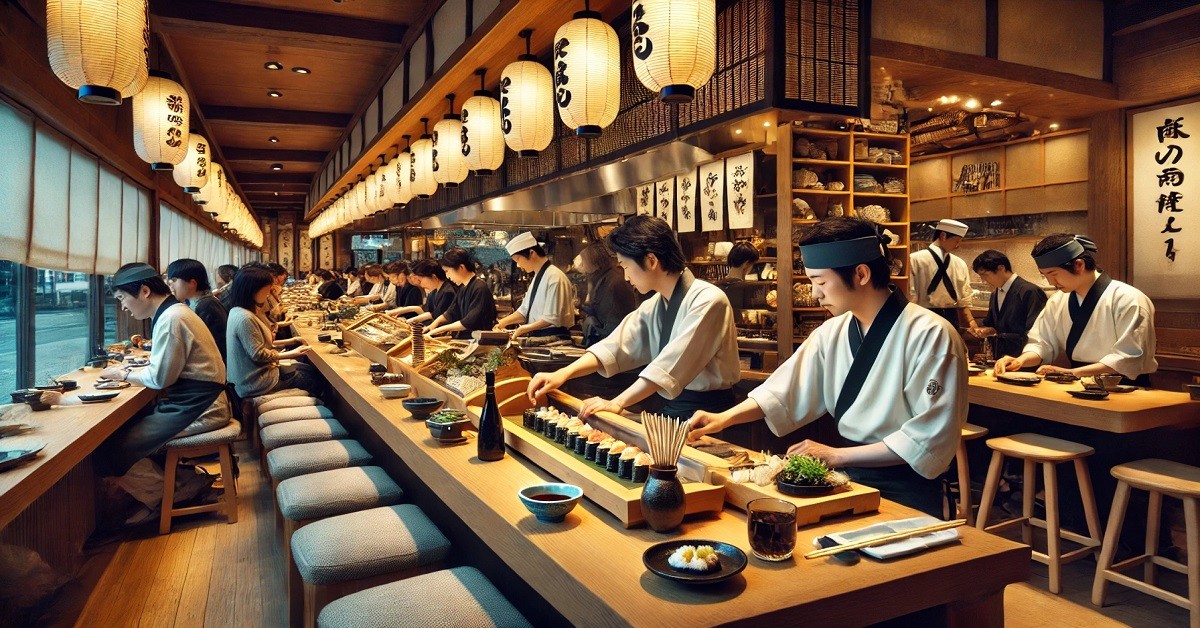With a structured work environment and attractive earnings, restaurant jobs in Japan provide a strong pathway for those aiming to work abroad.
Japan’s restaurant industry is a massive sector offering various employment opportunities.
From traditional ramen shops to high-end sushi restaurants, the demand for skilled and entry-level workers is growing.
Culinary Industry in Japan in the Modern Era
The food service industry in Japan is a mix of tradition and innovation.
- Michelin-starred restaurants, conveyor belt sushi chains, and international fast-food brands dominate the market.
- With a growing reliance on foreign labor, many restaurants offer positions suitable for non-Japanese speakers.
- Japan restaurant job vacancies have increased as aging demographics impact local employment rates.
- Technology also plays a role in restaurant operations, with automated systems managing orders and reducing manual work.
- However, human staff remain essential, especially in customer service and food preparation.

Types of Restaurant Jobs in Japan
According to your situation, you can seek a Japan restaurant job vacancy as:
Chefs and Cooks
Kitchen roles vary from sushi chefs to tempura specialists. Many foreigners start as assistants and work their way up.
While experience is preferred, some restaurant jobs in Japan for foreigners without experience are available in casual dining establishments.
Service Staff
Waiters, bartenders, and cashiers are in high demand.
Cafe jobs in Japan for foreigners provide entry-level positions requiring minimal Japanese skills, mainly in international or tourist-friendly locations.
Management and Specialized Roles
Restaurant managers, sommeliers, and food inspectors have higher salaries.
These positions require fluency in Japanese and significant experience.
Part-time vs. Full-time Jobs
Part-time restaurant jobs in Japan are common among students and temporary workers.
Full-time roles offer stability, benefits, and higher earnings, making them attractive for long-term employment.
Requirements and Challenges in Japanese Restaurant Jobs
If you look for restaurant jobs in Japan, keep in mind:
- Work Culture and Expectations: Japanese restaurants emphasize efficiency, politeness, and precision. Workers must follow strict hygiene rules and customer service etiquette. Even in entry-level positions, attention to detail is crucial.
- Language and Visa Requirements: While some restaurant jobs in Japan for foreigners without experience do not require Japanese proficiency, learning basic phrases helps improve job prospects. Visa sponsorship is typically available for full-time positions, especially in established restaurant chains.
- Challenges of the Industry: Long working hours, hierarchical management, and demanding customers can make restaurant jobs stressful. However, stable earnings and potential savings opportunities make these jobs financially rewarding for many workers.
Comparison of Japanese Restaurant Jobs with Other Countries
Restaurant jobs in Japan differ from those in Western countries due to cultural expectations, work ethics, operational structure, and financial aspects.
Work Environment
Japan’s restaurant industry is structured and disciplined. Employees follow strict protocols, from food preparation to customer service.
In contrast, Western countries often have more flexible and relaxed work environments.
Wages and Benefits
The restaurant job salary in Japan varies by role and location.
Entry-level staff earn around ¥1,000-¥1,300 per hour, while experienced chefs and managers can make significantly more.
Unlike Western countries, tipping is not customary, but bonuses may be provided.
Career Growth
In Japan, career advancement follows a strict training system.
Apprenticeship in traditional restaurants can take years, whereas Western countries may offer structured culinary programs and faster promotions.
Work-Life Balance
Japanese restaurant workers often face long shifts, including weekends and holidays.
Long working hours are common in Japan. Employees work beyond scheduled hours without overtime pay, as a dedication to the job is expected.
In contrast, Western countries emphasize work-life balance with regulated hours and overtime pay.
Foreign Worker Opportunities
Japan has specific visa categories for restaurant workers, and many restaurant jobs in Japan with visa sponsorship are available, especially in chains.
Western countries generally have fewer visa restrictions and more relaxed requirements for foreign workers in hospitality.
These differences make restaurant jobs in Japan unique and often more demanding, but they also offer stability.
How to Apply for Restaurant Jobs in Japan
Whether seeking cafe jobs in Japan for foreigners or full-time chef positions, there are openings for all experience levels.
Online Job Portals
Many Japanese restaurant job vacancies are listed on job search platforms such as GaijinPot, Indeed Japan, and HelloWork.
These platforms allow applicants to filter jobs based on experience, location, and visa sponsorship options.
Company Websites
Large restaurant chains and hotel dining establishments have dedicated recruitment pages.
Applying directly through these websites increases the chances of securing a position with visa sponsorship.
Recruitment Agencies
Several agencies specialize in placing foreigners in restaurant jobs.
They assist with visa processing, interviews, and contract negotiations, making the application process smoother.
Networking and Referrals
Word-of-mouth recommendations from friends or colleagues already working in Japan can help in finding job opportunities.
Some restaurants prefer hiring through referrals rather than public job postings.
Walk-in Applications
Smaller restaurants and cafes often accept direct applications.
Visiting the establishment in person with a resume can increase the likelihood of securing a job, especially for part-time positions.
How to Prepare for a Restaurant Job in Japan
Securing a restaurant job in Japan requires proper preparation, especially for foreigners.
Understanding the industry’s expectations, acquiring relevant skills, and meeting visa requirements increase job opportunities.
Formal Culinary Education (Optional, Recommended for High-End Jobs)
- When? Before applying for full-time restaurant jobs in Japan, typically after high school or during early career stages.
- Attending a culinary school (in Japan or abroad) helps secure positions in high-end restaurants and hotels.
- Many Japanese culinary schools, like Tsuji Culinary Institute or Hattori Nutrition College, offer specialized training.
On-the-Job Training (Common for Entry-Level Jobs)
- When? Can be done while working part-time or after securing a restaurant position.
- Many cafe jobs in Japan for foreigners and casual dining roles provide on-the-job training with no prior experience required.
- Foreign workers often start as kitchen assistants or servers and gradually move up.
Japanese Language Skills (Recommended Before Applying)
- When? Ideally, 6-12 months before job hunting to improve employability.
- Basic Japanese (JLPT N4 or N3) is helpful, especially for customer-facing roles.
- Restaurants in tourist areas may not require fluent Japanese, but speaking the language enhances job prospects.
Internships and Apprenticeships
- Best for: Aspiring chefs who want to work in high-end restaurants.
- Traditional Japanese restaurants often have long apprenticeship periods, requiring commitment and patience.
International Restaurant Experience
- Best for: Those planning to apply for restaurant jobs in Japan with visa sponsorship.
- Experience in a Japanese restaurant abroad (such as a sushi or ramen chain) can strengthen an application.
Understanding Japanese Work Ethics
- Punctuality and Discipline: Being on time is crucial.
- Politeness and Respect: Addressing customers and superiors properly is expected.
- Hygiene Standards: Personal appearance, cleanliness, and proper food handling are strictly monitored.
Practicing Customer Service Skills
- Memorizing Key Phrases: Basic Japanese greetings and polite phrases improve interactions.
- Observing Japanese Dining Etiquette: Understanding how food is served and presented helps adapt quickly.
Conclusion
Japan’s restaurant industry offers lucrative opportunities for foreigners.
Financial benefits, job stability, and cultural exposure make restaurant jobs in Japan an attractive option.
Individuals can build a successful culinary career with patience and dedication while securing financial growth and savings.






